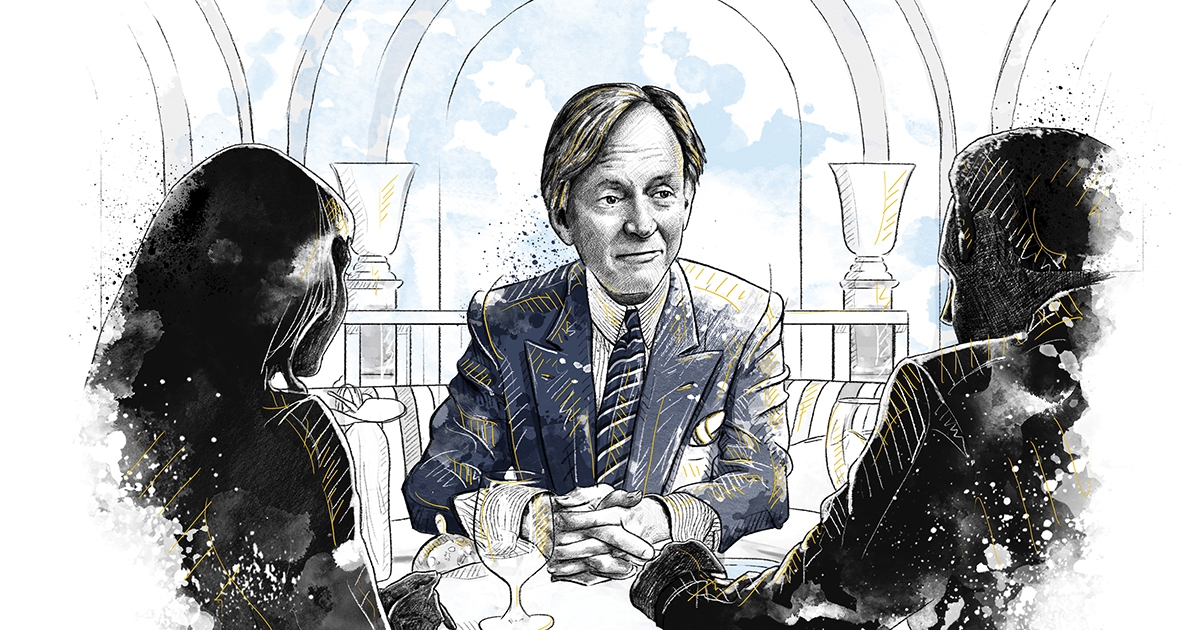It’s been nearly 20 years since the Saturday night when my wife and I were opening our menus at Zanzibar on State Street and I glanced up to see Tom Wolfe being seated alone at the table next to ours. I mean right next to ours. Chair-bumping distance.
No white suit. Navy blazer. Tom Wolfe.
I breathed into Leesa’s ear: “That’s … Tom … Wolfe.”
Her eyes got wide.
It was a difficult meal. What could you say, knowing Tom Wolfe could hear every word?
We paid our check and started to go. I wouldn’t have said a thing. A celebrity out in public just wants to be left alone, right? And I just could not reveal myself for what I was—a worshipper.
Then I heard Leesa, the woman with loins of steel, say: “Mr. Wolfe, I just wanted to say how much my husband and I admire your work, and we’re so glad to see you in Ann Arbor!”
Oh, no. Mortals who speak to a god are struck down.
He smiled and rose, shook our hands—Tom Wolfe just shook my hand!—and gave us the nicest five minutes of conversation. He was visiting campus to do research for a novel about college students, he said.
Then it was over.
Tom Wolfe.
* * *
But it was not over.
In the car Leesa said: “He’s researching college life! He’s going to need help!”
I want to say that what happened next was utterly contrary to my better judgment. In other words, I was petrified. But I could see what she was saying. I had just started the risky business of earning a living as a freelance writer. Freelance writers live or die by good luck and good contacts. Here was a chance at both.
So, under orders, I sat and typed a letter saying that Mr. Wolfe might get something out of some stories I’d written when I was still a reporter at the Detroit News. The series described the underside of student life at Michigan, from the “hookup” culture to intellectual alienation. And if he needed someone to do a little research …
We thought time was of the essence.
“He must be staying at the Bell Tower,” Leesa said. She called. The helpful clerk said, “Oh, no, Mr. Wolfe is staying at the Campus Inn.”
I dropped off the letter and the stories at the front desk by midnight.
* * *
The next day, Sunday, we were away from the phone until 6:30 p.m. When we got back, the voicemail light was blinking. “Mr. and Mrs. Tobin, this is Tom Wolfe calling. I’ve read the stories and I’d be very glad if you’d be able to join me for dinner this evening. You can reach me at the hotel.”
I called. He’d made an 8:30 p.m. reservation at the Gandy Dancer.
This part is hard to explain. Not the evening itself. That was wonderful.
He said he was talking to people about how students were living these days. He asked about the students I’d profiled. How had I done the interviews? (Tom Wolfe was asking me how I do interviews.) How much time had I spent with them? What was going on at Michigan that he should know about?
Then I was asking him questions—about “The Right Stuff,” a book I venerate as a sacred text of narrative nonfiction, and about his novels, “The Bonfire of the Vanities” and “A Man in Full,” which I’d just read. I can’t remember a thing he said except that after all the procrastinating (Tom Wolfe procrastinates!), every book, long or short, takes a year to write.
He was warm, charming, kind. We talked for two and a half hours. Then we went home.
The hard part to explain is what I wanted from him.
I wanted to siphon gas from his tank, to tap the vein of his magic. Don’t leave without telling me the magic …
* * *
He never called.
It turns out the novel he had been working on was “I Am Charlotte Simmons.” Leesa couldn’t finish it—too grim. I haven’t read it. I don’t know why.
When Wolfe died in May, I thought about that night and what I had wanted from him without knowing how to say it. Now, writing this, I realize he showed me, if not what I wanted, what I needed.
How did he get to be Tom Wolfe?
By working. A writer’s work is to listen, look, ask questions, and learn. I didn’t have much to tell him, but that was part of his work—to keep asking until he struck gold, to ask one person after another until he had a story worth telling. He’d been working that night.
What a writer needs is to get to work.
That’s the magic.
James Tobin, ’78, PhD’86, teaches narrative nonfiction at Miami of Ohio. His most recent book is “The Man He Became: How Franklin Roosevelt Defied Polio to Win the Presidency.”





